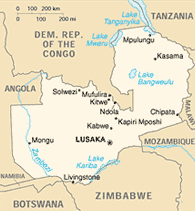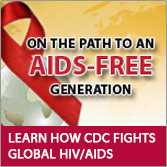Zambia
HIV/AIDS in Zambia
- 12.5% Estimated HIV Prevalence
(Age 15–49)(2013) - 27,000 Estimated AIDS Deaths (2013)
- 600,000 Estimated Orphans due to AIDS (2013)
- 446,841 Reported Number of Adults Receiving Antiretroviral Therapy (ART)(2012)
- 86% Estimated ART Coverage per WHO 2010 Guidelines (2012)
SOURCE:
UNAIDS Gap Report, 2014; UNAIDS Global Report, 2013

Strategic Focus
The CDC HIV/AIDS office in Zambia was launched in December 2000 and has worked closely with Zambia’s ministries and provincial health offices to build a robust national HIV/AIDS response. CDC has worked in a step-wise fashion to build the additional capacity and infrastructure necessary for a sustainable, high impact HIV response in Zambia. Areas of strategic focus include:
- HIV prevention, care, and treatment
- Integration of HIV and tuberculosis (TB) management
- Public health workforce capacity strengthening through a Field Epidemiology Training Program (FETP)
- National Public Health Institute development
- Health systems strengthening: surveillance, laboratory, and health information systems
- Blood safety
- Noncommunicable diseases: Reduction in maternal mortality, cervical cancer screening and treatment
Key Activities and Accomplishments
Voluntary Medical Male Circumcision
There has been tremendous progress in uptake-- from 84,604 circumcised in 2011 to 856,039 by the end of 2014.
Electronic Health Record (EHR)
Smartcare is a public domain EHR using microchip, touch screen, and solar technologies to improve patient care and public health reporting for persons with HIV. Over 500,000 persons are enrolled in the system.
Prevention of Mother-to-Child Transmission (PMTCT)
PMTCT services have been expanded to 808 Zambia public health facilities, with 91% of these sites providing Option B+, up from only 1% in 2013. Antenatal HIV testing has increased from 13% in 2005 to 96% in 2013 (DHS 2013), and 96% of HIV-infected women received antiretroviral therapy (ART) in 2013 as compared to 30% in 2006, with 66% on lifelong ART.
HIV Treatment Program
74% of all eligible people living with HIV (PLHIV) by a CD4 threshold of 500 were in treatment in 2014, representing a programmatic Tipping Point metric of 0.9 based on PEPFAR treatment program results.
Saving Mothers Giving Life (SMGL)
Since June 2011, institutional deliveries in the pilot districts increased from 22,604 to 33,374 in 2014 while facility based maternal mortality rates declined from 298/ 100,000 to 101/ 100,000 in 2014 (a 66% decline).
Integrated TB and HIV Control
Scale-up of integrated TB/HIV programming has helped contribute to dramatic progress: an increase of HIV testing for TB patients from 22% in 2006 to 86% in 2011, an increase of Cotrimoxazole initiation from 31% in 2006 to 93% in 2013, an increase of ART up-take amongst TB/HIV co-infected patients from 34% in 2006 to 65% in 2013, and a 50% reduction in the mortality rate of TB patients from 8% in 2005 to 4% in 2013.
Contact Us:
- Centers for Disease Control and Prevention
1600 Clifton Rd
Atlanta, GA 30333 - 800-CDC-INFO
(800-232-4636)
TTY: (888) 232-6348
24 Hours/Every Day - cdcinfo@cdc.gov
 ShareCompartir
ShareCompartir



